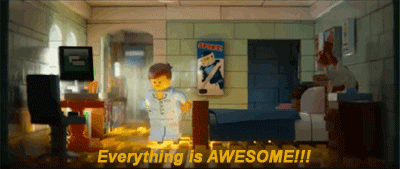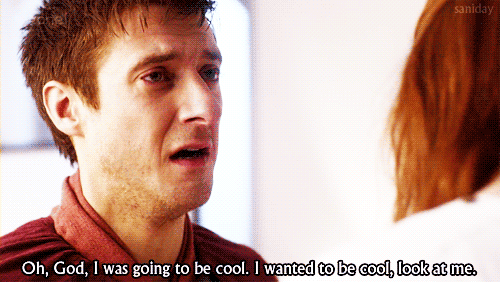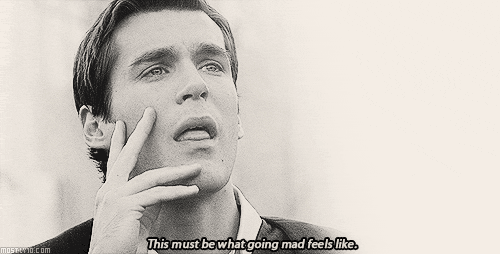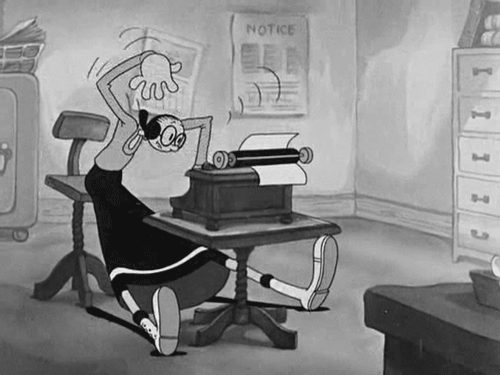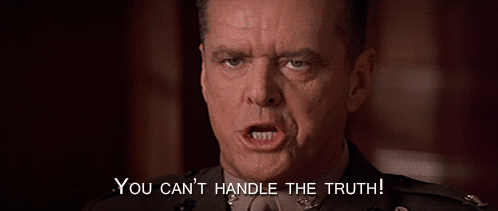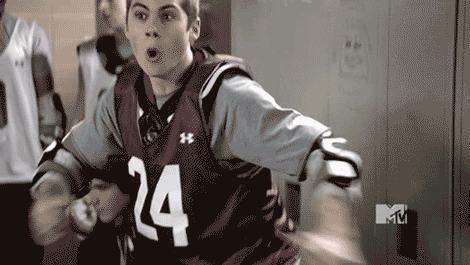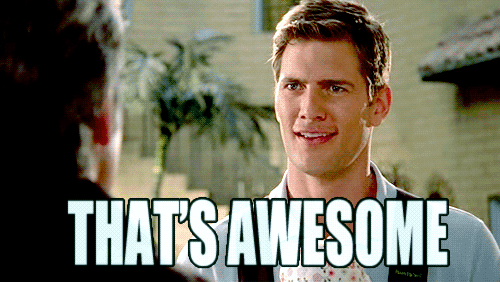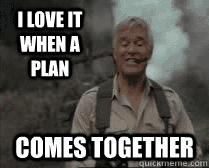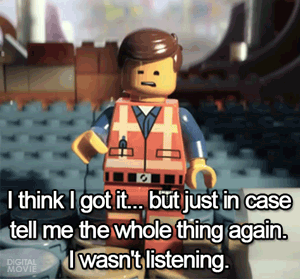I’m not normally one for blog parties, where someone tags you on their blog or in your comments or on social media and commands you to write about a thing you have no real interest in writing about. (Or at least, that sums up most of the ones I’ve been invited to participate in, YMMV.)
But!
The illustrious Kim Green invited me to participate in a discussion on writing processes, which is a subject I find fascinating.
Not my own, obviously. I live with me, and therefore my own process (IF THAT EVEN IS ITS REAL NAME) has lost all glamour and intrigue for me. But I love reading about the processes of other writers, and as you are not me, that makes me other writers to you.
Wow. That sentence was…something. Buckle up, kids, as I am sure you now want to hear about my process so you can imitate it and enjoy coming up with gems like “as you are not me, that makes me other writers to you.” You’re welcome.
Okay, first off, a disclaimer. Talking about “my process” feels a little bit like a sham, as “process” seems to imply
a) planning
b) structure
c) consistency
and mine is not reliable on any of those fronts. It changes from book to book and from day to day, based on what I’m writing and what else is happening in my life and whether I’ve had coffee and what other forms of entertainment I’ve consumed lately.
Chaos, baby. It’s how I roll.
However, maybe some of you are getting discouraged when you read about how other writers schedule their days down to the minute and think, I can never be that organized! Alas and alack! I shall never write a book!
If that’s you, I’m here to tell you, you can still write a book.
Disclaimer #2: I admire the ever-lovin’ heck out of writers who can stick to a daily schedule. My amazingly talented friend Victoria recently posted her schedule and I’ll be honest, I just stared at it in awe for a while. How does one make the minutes in their day behave like the Von Trapp children, all orderly and in a row, while my minutes insist on romping through the trees wearing nothing but some old drapes?
Oh wait. Those were also the Von Trapp children.
The Von Trapp children are not a metaphor I was planning on using when I started this post, but there you have it. Chaos Theory in action.
The point is, there is no one right way to write a book. Or a blog post, or a news article, or graffiti on a bathroom stall. No writer I know worth his or her salt claims there is. As long as you are getting words on paper, or on your computer screen, or etched onto a stone tablet, or scrawled onto a cocktail napkin, or spray painted on that bathroom stall*, you are moving in the right direction.
*I’m going to get in trouble for this. Don’t graffiti bathroom stalls, people. Unless it is your bathroom stall that you own, or you have received permission from the bathroom stall owners, in which case, have at it.
All roads can lead to books. All processes can be valid. All minutes are ultimately Von Trapp children.
So, with those disclaimers out of the way, let me get into the questions I’m actually supposed to be answering.
What am I working on?
Heh. Um, several things, and they’re all very different from one another. Front and center are my YA superhero thriller, which I’m in the process of revising with my agent, and a YA contemporary retelling of a Shakespeare play, which I am deep into drafting. But in the cracks and spaces between those two projects, I’m also pondering revisions of my YA epic fantasy, plotting out my YA time travel historical mystery, thinking about the illustration on the cover of the books, and thinking whether I should opt for perfect binding (which, by the way, can be availed from firms like Printivity- https://www.printivity.com/books/perfect-bound-books).
As I said. Quite different.
Chaos, baby.
This does play into the process question though, because I have to prioritize these projects somehow. All of my works-in-progress have my agent’s blessing, but that doesn’t mean she’s okay with me pinballing between them like a squirrel on speed. If I tried to do that, I’d never turn anything in, ever. I am not one of those writers who can simultaneously write four books, much as I might want to. About the most I can handle at once is drafting one book and revising another (and even that is tricky, as pulling my brain out of one genre and plopping it into another is easier said than done). So what happens when I get ideas for the books I’m not actively drafting or revising?
Notes!
I use Scrivener, which I love as much as a human can love a computer program without getting creepy about it. More “breakfast tacos” levels of love, less “Her.” Scrivener lets me jump into that book’s file, jot a few notes, and flit back out of the program without the back-burner book’s pages so much as rustling in my wake. It’s perfect for me, because I don’t have to keep ideas in my head (which is a terrible place to keep them, as I lose things in there all the time), but I don’t have to actively work on developing them either.
And with those other ideas safe in Scrivener and out of my brain, I can better focus on my main projects. For me, it’s really good to have a pipeline, because each stage of writing comes with different kinds and levels of excitement. I love starting a new draft (excitement! possibilities! infatuation!), but finishing can be difficult. So it’s good to be able to fine-tune something that’s nearly finished, or jot ideas on something that’s still brimming with potential, when I need to jump-start my enthusiasm.
How does my work differ from others of its genre?
This is a funny question, mostly because it’s not one I ask myself when I start a project. I write, first and foremost, the kind of stories I’d like to read. For that reason, I think what I write is different from what’s currently on shelves, simply because if it already existed, I’d probably rather read it than write it. No way I’m spending that much effort writing a (probably lesser, because let’s face it, copies are normally not nearly as sharp as the original) version of something that’s already out there.
It’s also hard to give a broad answer to this question because I write in multiple genres, so there’s no one thing that distinguishes my body of work from every other YA genre. However, I will say there are a few themes that keep popping up in all my stories, whether they’re about Reluctant Superheroes or Uppity Teens In Love or Illegal Powers And Dragons or Accidental Time Travel, that make them a bit different from a lot of what’s currently on the YA shelves of your local library.
The main one is probably my heavy emphasis on family. YA has a lot of orphans, only children, detached parents, and estranged parents. This is often by necessity – it can be hard to make a teenager a central player in a story where he or she has to submit to so many varied forms of authority. This doesn’t make those books inherently good or bad – there’s a lot of things that go into the making of a good story aside from whether the main character has family members present. But for me, I haven’t written anything yet that doesn’t have strong familial themes, and while I know to never say never, I’ll be surprised if that changes.
Whether it’s parents or grandparents or brothers or sisters or cousins, I am intrigued by families, how they interact, how they love, how they disappoint, how they surprise. Siblings are fascinating, because they share a lifelong bond, but may not have compatible personalities, and I like playing with that dichotomy. Then there’s the relationships between grandparents and parents and kids, and the ripple effect of one generation influencing the next influencing the next. Having two kids of my own, I spend a lot of time thinking of how most parenting decisions are made with the intent of doing what’s Best For Your Kids, but there’s often no way to know if you made the right call until much later. I like picking up the threads of those good intentions several years later, once everything has unraveled, and figuring out how to reconcile what the characters intended with what’s happened.
Then there’s also the fact that I experiment with different styles and perspectives. For instance, I may not limit myself to writing in first person or using third person point of view. I think all of these styles have a unique way of telling the story, and as a writer there’s different ways in which the plot can be accentuated by the personal flair, as well.
My work has a few other quirks that I believe gives it its own unique flavor. But I think I’ll leave it there for now.
Why do I write what I do?
I feel like I pretty much already answered this question. I write stories I want to read. I write characters that interest me. At the end of the day, writing is a long, labor-intensive process where a huge amount of the work has to be completed before there is ever even the possibility of being compensated for it. For me, that means that I really need to love what I’m writing, because if I don’t, that is a whole lot of effort for no guaranteed payoff. It also means that even if these books never sell (even though I sincerely hope they do), I’ll still be glad I wrote them, because I love the stories and I loved the act of writing them.
How does my writing process work?
Oh hey! You were wondering if we’d ever get back here, weren’t you?
Okay, as I stated earlier, “my process” is a tricksy beast. It varies a lot, and is influenced by a myriad of exterior factors. But here are a few things I have learned about this crazy thing called writing, that will always be true no matter what I’m writing and what’s going on in my life.
- I have to write on a computer. That could mean lots of typing and a lot of time when my hands and wrists are in the same position. This does pose problems later like carpal tunnel, but I’ve learned that it can just as easily be avoided by using a wrist rest or an ergonomic keyboard. Lots of writers find writing longhand helps them get past their inhibitions because they don’t self-edit as much. This…is not a thing I can do. Everything I do must be typed. Give me a blank piece of paper and a pencil and I will blink at you like you just asked me to casually sketch the Mona Lisa. I type drafts. I type notes. I type synopses. I type outlines. SPEAKING OF WHICH!
- I suck at outlining. I’ve tried it, and I very much believe there’s something to it (I will stand by Blake Snyder’s SAVE THE CAT being a fabulous method, even if I can’t actually stick to a beat sheet to save my life), but I suck at it. I am very much a pantser, and have been known to plunge into books with absolutely no idea where they are going. Actually, the easiest book I’ve drafted so far had literally no plot whatsoever going in. I had a single sentence as an idea, and crafted the story as it came to me. The hardest book I’ve written was the one with the most intense outline going in. The more restrictions I place on myself in terms of a pre-determined plot, the harder it is for me to let my ideas flow.
- HUGE DISCLAIMER: This is also why I have to re-write entire books. First drafts are guidelines for me. Once they’re written, only then can I truly see the story I want to tell. Then I have to plunge back in and scrape away all the gunk clogging up my story, and there is always a lot of gunk.
- But I’d rather have a lot of gunk than nothing. You can’t edit a blank page.
- I draft quickly in general, and fastest when I have absolutely no idea where I’m going. Some people write 500 words a day, but each of those words is carefully crafted and meticulous. I tend to vomit out multi-thousand word chunks, knowing full well that I may go back and delete most of them later once I figure out what I actually want to do. (That said, I firmly believe that no matter what your process, first drafts are meant to be rough, and that there is no bypassing this step.)
- Chaos, baby.
- I write best at night. Which is a little inconvenient, since my kids are in school during the day and while I work part-time from home, I typically have huge chunks of time to myself during daylight hours. I so very much want to devote a majority of that time to creating Brilliant!New!Words! But, most of the time, I can’t. Which means nighttime is for words, and daylight is best for:
- Revision (drafting and creating are very different processes for me, and I can revise even if I’m not feeling particularly creative)
- General Responsible Adulting, ie: errands, cleaning, taking the dog to the vet, paying bills. Bah.
- Refilling the creative tank: For me, I get the most inspiration from television. I know this just sounds like I’m making excuses to sit on my couch and binge-watch Netflix (which, valid), but I try to watch with a critical eye. What’s working in these shows? What aspects are pleasing to me, and why did those choices evoke that response? What characters do I like, and why? How do they handle multiple plot arcs, multiple POVs? What is it about the writing that draws me in? What annoys me, and why? How do they balance kicking off a new storyline while resolving an old one to my satisfaction? Obviously, I also have much love for good storytelling in the form of books and movies, but for me, television is my main squeeze.
- Reading cross-genre. I can’t read in the genre I’m writing, but I like to read books in other genres (for example, while drafting my Superhero Thriller, I read nothing but Contemporaries) and figure out what aspects from those I can work into my own story. This isn’t so much about refilling the creative tank (don’t worry, TV, you’re still the one for me) as it is craft. I like seeing what makes other books tick, and trying to learn something from it. Did a book pull off a killer twist? How? Why was it satisfying? When did they start setting it up? What sorts of clues did they drop? How did they throw me off the scent? I realize these are similar to my TV questions, but because of the medium, I find I am a lot more clinical about my approach to books than my approach to TV. TV is mostly for creative stimulation. Books are for craft. (Again, YMMV – I know tons of writers who are the opposite.)
- Critiquing. I…have very passionate feelings about critiquing. So much so that I’ll save them for their own separate bullet point.
- Meeting with other writers, either to write or just to discuss our projects. Sometimes I can’t just fritter away all of my day, because I need to be making forward progress or risk totally throwing off my groove and missing deadlines. I am extremely blessed to have a wonderful writing community here in Nashville, and I have several people I can meet with at Panera or a local coffee shop to share a table while we both pound out the words. A change of scenery is really helpful for getting myself out of a rut (plus Panera’s WiFi suuuuuuucks, which means fewer Twitter distractions), and it also gives writing a sense of accountability. If you’re sitting across from someone, they’re probably going to notice if you never crack open your laptop and just stare into space for three hours. PLUS I cannot overstate how helpful it is to have someone Right There for when I have to look up and ask a Super Important Question like “Okay, if I’m tied up like this and can’t afford to break my wrist, how do I escape?” (Even if your local writing community is nonexistent, I still highly recommend the Change Of Scenery to the Land of Sucky Wifi.)
- CRITIQUING! Here is that separate bullet point I was talking about. (Honestly, I could do an entire blog post just on critiquing.) I adore critiquing, and it is utterly vital to my process. But here is the thing that a lot of people don’t seem to get about critiquing: it is about giving. I try to make it a point to always be doing more critiques than I’m receiving. Yes, it is important to get my own work critiqued. I have a critique group and critique partners that are worth more than their weight in gold. But to be the best writer I can be, it is essential that I am consistently offering solid critique. Doing a critique gets me in the mindset to be objective about my own work, and forces me to acknowledge the things that aren’t working. It can be tough. I’ve given critiques to friends that resulted in me having to toss a significant portion of my own story. But I have never done a critique where I came away feeling that I had learned nothing. That said, here are a few things to keep in mind about critique:
- Offer before asking, and give each critique your best. If you want an honest critique on your own work, put the time and effort into giving a good critique for that writer. I find that if I offer to critique for others and do the best, most thorough job I can, they more often than not will offer to read for me, and no one has to be put in the awkward situation of asking someone who may or may not have that sort of time to give.
- That said, don’t just chase writers around Twitter asking them if you can read their work. If you don’t have a local writing community, or are not part of an online writing community, I suggest either joining an organization like SCBWI or RWA and connecting with other writers that way, or finding critique partners on a site like Absolute Write or HowAboutWeCP.
- Be honest without being harsh. Critique is not cheerleading. If all you do is point out the things you love, that writer is never going to get better. But critique is also not just exploding your own subjective opinions all over their manuscript. If you are overly harsh, you risk sending the author into defensive mode, and also poisoning your critique relationship. So if you hate your critique partner’s main character, maybe don’t say “I hate your main character,” but instead say “I found the way your main character stole candy from babies and kicked puppies troubling, and as such had a hard time connecting with her.” You’ll also notice that the second example is constructive (“I can totally cut back on the candy-stealing and puppy-kicking!”) and the first is not (“Well…I’m sorry?”). Always remember that you are trying to help an author make their work better, not penning a book review.
- Don’t dish out what you can’t take. If your critique partners are telling you something isn’t working, don’t be too proud to examine it and see if there’s a way to make it better. This doesn’t mean you have to take every bit of critique you ever receive (because that would be impossible, as critique partners often disagree), but if there’s a common thread, don’t be afraid to tug on it.
- Scrivener! Seriously. It is my best friend. I want to braid its hair and bake it cookies.
- Community! Whether it be my friends I see every week or my friends on Twitter or my friends who live in my phone (ie: much texting without ever really seeing each other in person), my writing community is so, so important to me. Don’t have a community? Go to local book events, attend writing conferences, interact on Twitter, join a forum. There are so many ways to connect with other writers, especially with the Magic of the Internet.
- Celebration. A wise friend of mine once said that if she had to choose between seeing her name in acknowledgements and seeing her name on spines, she’d choose acknowledgements. I think that’s such a wonderful philosophy to have. Sure, I have my goals and my hopes and my dreams. But my life is full of so much more joy if I can celebrate my friends’ accomplishments with sincerity. Also, publishing is slow, but the time passes a lot quicker when you can be excited for every finished draft, every agent signing, every book contract, every release. (And who doesn’t want an excuse to break out the cake every couple months?)
- Last but not least, coffee. Oh sweet caffeine, where would I be without you?
Phew. That was long.
How about you, friends? What is your process? What gets the blood pumping and the creative juices flowing? What are your silver bullets, your black arrows, your Elder Wands? Do such things even exist?
And if so, where does one find one? Asking for a friend.

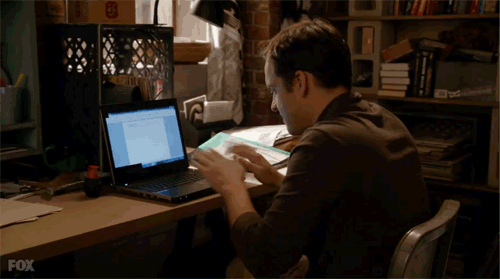

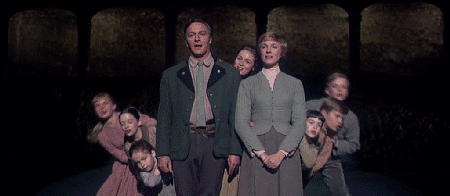


.gif)




